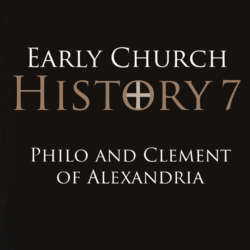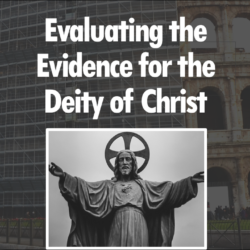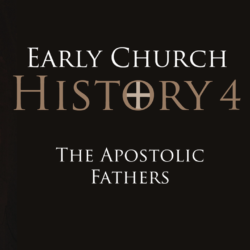So, I’ve been cancelled. In my last post, I pushed back against William Varner’s claims that 2 Clement 1.1 provides evidence for the Trinity prior to Nicea. This post was getting a good amount of attention already when I posted a link to it in the facebook group “Nerdy Biblical Language Majors” (NBLM), which has over 8,000 members and where Varner himself is one of the admins.
I figured my post wouldn’t last long, since it challenged an influential man and an important idea. First Varner commented on my post, claiming he never said 2 Clement 1.1 supported the Trinity, merely the deity of Christ. For those of us who attended the talk at SBTS, we know that Varner clearly implied that 2 Clement 1.1 was evidence for the Trinity. He talked about “one of our own” who believed the Trinity did not develop until Nicea in the fourth century. This was the context of his remarks on 2 Clement 1.1. He brought up the text specifically as counter-evidence to the idea that the Trinity had to wait until the fourth century to find expression.
Next, Varner complained that my post should be excluded, because it did not relate to biblical languages. Before I could reply, another admin swung in and closed comments for the post. By the next morning, I could no longer find the post or the group–alas, I had been digitally excommunicated, permanently blocked without recourse.
What didn’t happen was dialog on whether or not 2 Clement 1.1 proves that the author believed in the Trinity. I raised the issue and I was cancelled.
Ironically, I suppose that we are actually all in agreement now about 2 Clement’s lack of Trinity support. Varner’s response that he only argued for the deity of Christ not the Trinity was itself a tacit admission that 2 Clement couldn’t be used to establish that the Trinity prior to Nicea! I suppose a pyrrhic victory is better than none at all.
But, why was there such a decisive and extreme response? Is that how a scholar should operate? If someone challenges your conclusion, should you just deplatform him/her? Is this the kind of behavior Christ followers should have? What happened to Matthew 18?
But, aside from my complaints about how the NBLM group expelled me without so much as a message explaining their reasons why, I’d like return to the issue I raised.
Within some corners of evangelicalism, it’s still popular to hold to the Trinity-primacy assumption. The idea goes something like this: from Jesus onward, God’s people have believed in the Trinity until Arius the heretic came along and challenged the idea. However, when we ask for evidence in the church fathers, we’re given a handful of proof texts that are compatible with various Trinity theories but can equally fit with other views. See my “Trinity History before Nicea” video.
Whether you believe in one of the various Trinity theories or not, we should be honest with the historical record. If the Ante-Nicene Fathers believed in a Trinity theory–fine. If not–fine. But, let’s just be honest with what’s there and what’s not.









Sean, I saw your post in both NBLM and in NTM (Nerdy Theology Members), where someone shared your post. Last time I checked, it was still up in NTM with only two comments of pushback.
I’m disappointed that you were barred from the group, especially without explanation or warning. The lack of courage and willingness to engage in conversation on difficult topics in our era is pathetic, but historically, probably not something new.
When I left the christian community I experienced this. Theology aside,I experienced this, along with many people in other areas of controversial disagreement. I’m anti Covid vaccine, not anti vaccine. I’m anti mask, and anti lockdown. I supported Trump and I think Biden is a yutz. I’ve been cancelled and blocked for sharing my opinions. Mainstream people such as Gad Saad and David Rubin, have been cancelled at times.
This is the way of the land, it seems. I’m still hungry for intellectual honesty within conversation.
May we learn to listen to all conversational points, theological or not.
Best!
They are insecure and afraid.
I was removed and blocked from that fearful scholarly group for pointing out the aorist passive verb in Matthew 28:6, which would be better translated, “he is not here, he HAS BEEN raised…”
I asked one of the administrators whom I know, why I was removed. I made only an observation about a Greek NT text with a suggested better translation. He said he didn’t know why.
Complete love casts out all fear. It’s a sign of the times in the last days men will not endure found doctrine.
You guys keep up the great work your doing.
Kent
The problem with 2 Clement or let’s say, the Epistles of Ignatius of Antioch, is simply that these writings are not inspired, & therefore, not authoritative. Not only that, both have questionable authenticity. It’s like chasing after the wind when confronting the “trinitarian establishment” on these. It’s enough just having to deal with their misinterpretation of passages within the Bible to support their doctrine.
How can we verify canonicity?
Varner’s income depends on giving his audience what they want. To engage would lose them money. You’ll notice Heiser, for example, wants no part of Trinity debates beyond this sort of thing https://trinities.org/blog/podcast-275-exposing-dr-heiser-to-actual-biblical-unitarian-thought/
Wouldn’t a Tuggy-Heiser debate be grand tho?
Yep, that’s always the “elephant in the room” It’s like being born again in “Trinitarian Egypt” & establishing a comfortable situation for yourself & not dare thinking of leaving. I was fortunate enough having really nothing to lose at the age of 50 when the “God of Biblical Unitarianism” showed up in my life & declared Himself to be the God of Abraham, Isaac, & Jacob.